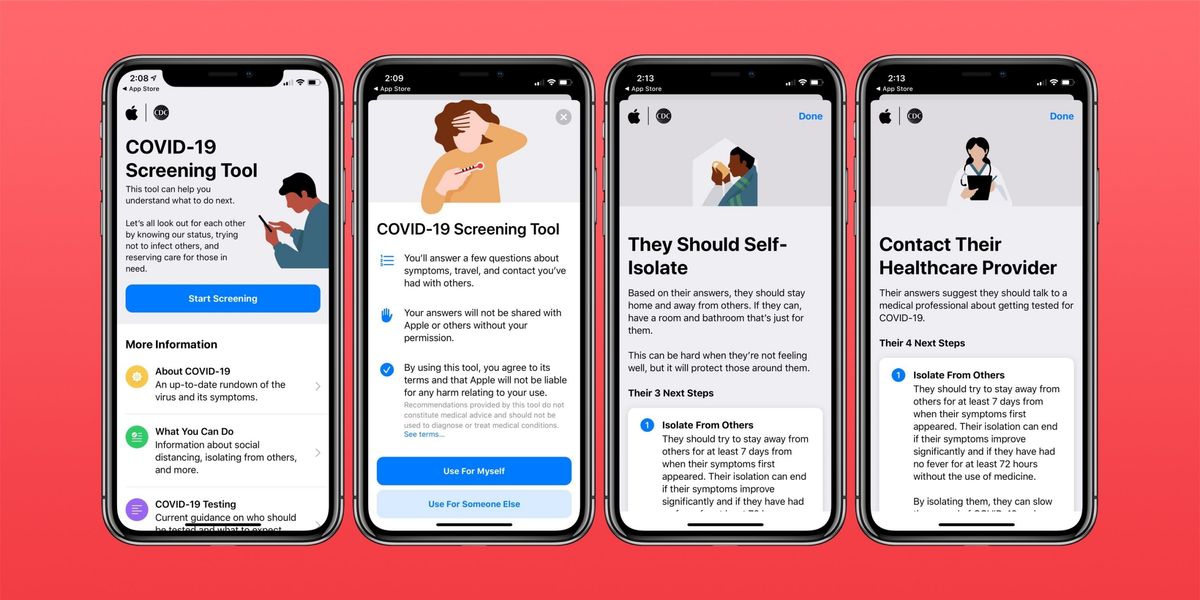How Apple’s new app is keeping you informed about getting tested for COVID-19

A few minutes every morning is all you need.
Stay up to date on the world's Headlines and Human Stories. It's fun, it's factual, it's fluff-free.
Apple released an app on March 27 that serves as a screening tool and resource for staying healthy and informed during these uncertain times. The app is particularly useful for determining your risk factors and giving advice on staying healthy, avoiding transmission and whether or not you should get tested for the virus.
How does it work?
First, you’ll need to download the app, Apple COVID-19, from the App store. If you are an Android user or would rather not get the app, Apple also created a web version so that the resource is available to everyone, regardless of platform.
Next, you’ll go through a series of screening questions that will assess your risk factors. These will be questions about any symptoms you may have, recent travel and contact with others.
The app offers the option to screen either yourself or another person. If someone in your life is presenting symptoms or you are worried about their risk, you can use the tool to get information and resources that will help you both.
How does this tool help?
Apple explained during its release that this resource was “created in partnership with the (Centers for Disease Control and Prevention), the White House Coronavirus Task Force and the (Federal Emergency Management Agency) to make it easy for people across the country to get trusted information and guidance at a time when the US is feeling the heavy burden of COVID-19.”
One major concern throughout this entire coronavirus ordeal is the US healthcare infrastructure. By assessing your risk with these known outliers, you can determine if testing is necessary as well as if emergency treatment is advised.
Some people may experience symptoms of COVID-19 without being advised to rush to the hospital for treatment. Not only is this potentially unnecessary, it can also be risky when it comes to spreading the virus. However, both the app and the web tool aim to keep you informed and up to date with relevant information on your risk factors. That’s besides advice on the steps needed to protect yourself and others.
Bear in mind that Apple has stated: “this new screening tool is designed to be a resource for individuals and does not replace instructions from healthcare providers or guidance from state and local health authorities.”
What are the alternatives?
Aside from following the recommended advice published by the CDC, you can track updates and find additional resources available through organizations like the World Health Organization or The National Institutes of Health.
Those concerned with international travel, study abroad or international education will be interested in the database provided by NAFSA: Association of International Educators for travel and visa updates along with other resources. The National Alliance on Mental Illness offers resources for those struggling with mental health issues related to the pandemic as well as general information for coping with this difficult time.
Healthcare workers (and people interested in the healthcare side of the topic) will benefit from the expansive amount of information available from Wolters Kluwer, which includes published data “to support health professionals working around the clock to meet those most in need.”
Harvard has also published its own database for coronavirus information, including information about COVID-19 testing and how it works, vaccines and medical science updates related to the disease.
Equally helpful are local government resources, so be sure to check for updates and databases made available in your particular region.Other tools are particularly useful as a resource for tracking updates and real-time information about the novel coronavirus and COVID-19.
The Coronavirus App, made by two French expats living in Taiwan, offers a tracking system with real-time updates about outbreaks, active cases, deaths and recoveries based on location.
There are a number of other apps available for both iOS and Android to keep track of updates and self-report symptoms. However, be careful about the apps you download.
Some of these may not be taking your privacy into account and you could be sharing more information than you wish. Google recently banned a number of apps that didn’t meet the standards of being approved by reputable organizations. Whichever resource you decide to use, make sure it is coming from a reliable source and that you are protecting your personal data. With these resources, we can stay informed and prepared for the days ahead.
[article_ad]
Have a tip or story? Get in touch with our reporters here!
Sign up for daily news briefs from The Millennial Source here!




Comments ()